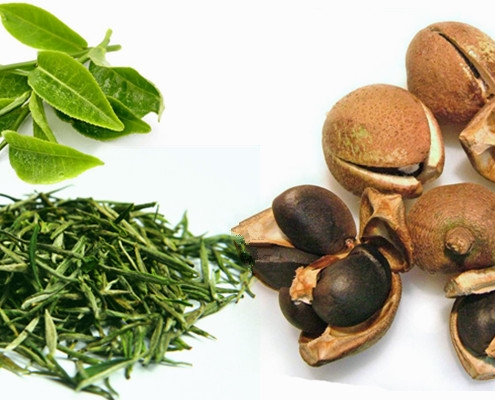What are the applications of tea saponin powder?
What is tea saponin powder?
Tea saponin is extracted from the seeds, leaves, roots and other parts of the tea tree. According to the different extraction parts, the chemical structure of tea saponin is also different. The basic structure is composed of triterpenoid saponins, structural sugars and structural acids. The pH of the aqueous solution was 5.7.
Known as a glycoside, tea saponin powder has a variety of applications in agriculture, textiles, and daily chemicals. This naturally occurring substance is a natural nonionic extractive that is used as an insecticide on plants and flowers. It has also been used as a soil conditioner and to control pests under the soil. Depending on its concentration, it can be useful for controlling pests in the fields, as well as for treating soil. Its soluble properties make it an excellent chemical insecticide for use on the soil and plant life. It is soluble in water and other chemicals, including methanol and acetic acid.
The production of tea saponin powder is increasingly expanding. This glycoside compound is an excellent natural surfactant, as it has many applications in the light and chemical industries. It has been used as a foaming agent in oil fields and in detergents. It also improves the biodegradation rates of organic pollutants and heavy metals. Therefore, it’s a great option for pollution control. The application of tea saponin powder is growing.
The role and efficacy of tea saponin
Tea saponin is a highly effective de-alcoholic compound that has a wide range of applications. It has a high hemolytic effect, is a natural insecticide, and promotes plant growth. Other uses include the development of plants, light industry, building materials, and highway construction. It is also a powerful soil conditioner and can improve soil health. It’s also a highly effective surfactant and has several other advantages.
1.Tea saponin is often used in air-added concrete. It has a foam-stabilizing and degreasing effect, which makes it a better choice than honeylocust powder. It also has paraffin emulsification properties and has improved the stability of concrete settings. It’s also used in fiberboard gel crafts, where it decreases moisture absorption, increases waterproofness, and enhances the quality of the fiberboard.
2.In addition to being used as a soil remediation product, tea saponin has multiple uses in the healthcare industry. In addition to being used as a cleaning agent, it can be used as a hair and clothing foaming agent. Its antibacterial and antifungal properties make it ideal for washing clothes. Further, it doesn’t reduce color and shrink, making it a valuable product for cleaning the environment.
3.Tea saponin is a natural compound that is a rare surfactant in daily chemical production. It is a common ingredient in shampoos and has been proven effective in cleaning contaminated surfaces. However, its anti-inflammatory properties make it ideal for agricultural use. In addition to its benefits for the skin, it is also used in the manufacture of bubble wine. So, the use of tea saponin powder in the agriculture industry is growing.
Tea saponin powder is a triterpenoid saponin that is extracted from tea leaves. It is used as a shampoo for hair, and it is considered a safe and effective product. It has similar properties to honeylocust powder, which is one of its main advantages. The application of tea saponin powder is a safe and efficient way to clean your hair. The use of the powder in this way can prevent your scalp from rashes and it also helps in your skin.
Another important benefit of tea saponin is its antibacterial, anti-inflammatory, and antimicrobial properties. It has been found to be effective in cleaning diazo copy paper and photographic film. It also has a fire-retardant effect and can be used as a fire-fighting agent. These are all very valuable applications for tea saponin powder.
The application of tea saponin powder is a safe and effective way to treat soils and water. It has been proven to effectively degrade organic and heavy metal contaminants. It can also be used to treat soils and increase the biodegradation efficiency of organic and inorganic pollutants. Despite its potential, tea saponin is still in the application stage. Research on the compounds is ongoing. This new product is expected to benefit the environment in a number of ways.
If you’d like to learn more about its many uses, please discuss with [email protected]






